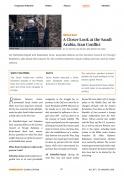What historical factors inform the present crisis?
Sebastian Sons: Saudi Arabia has regarded Iran as its most formidable antagonist in the struggle for supremacy in the Gulf ever since the Islamic Revolution of 1979. Moreover, as the Saudis see it, Iran has considerably increased its influence in the region since 2011 – and has done so at the expense of Saudi stability. The Saudi royal family has the impression of being surrounded by Iranian vassal states in Yemen, Syria, and Iraq. Now, after the establishment of a nuclear deal between Iran and the West, King Salman’s new Saudi government feels let down by partners like the US, while Iran’s international importance has increased enormously.
Ali Fathollah-Nejad: During the Cold War, Iran and Saudi Arabia formed the twin pillars of US foreign policy in the Middle East, but this changed abruptly with the Iranian Revolution. From then on, the Islamic Republic of Iran pursued a foreign policy independent from the West. Hence, Tehran entered into conflict with the West, and the US in particular, as well as with pro-Western countries in the region, including Saudi Arabia. In the 1990s, under Iranian President Ali Akbar Hashemi-Rafsanjani, Saudi-Iranian relations were marked by détente. The current Iranian government had similar aspirations, but given the latest escalation they have had to be shelved for the time being.
Is this about sectarian rivalry between Shiite Iran and Sunni-Wahhabi Saudi Arabia or is it more a matter of geostrategic rivalry?
Sons: The rivalry stems from the struggle for power in the region. Saudi Arabia’s aim is to gain political influence in the region’s crisis zones in order to secure its own interests. It also wants to assert its position of economic supremacy as a major oil producer, using its policy of keeping oil prices low to drive potential competitors like Iran from the market. The Saudi royal family exploits the sectarian conflict in order to perpetuate an image of the “enemy” and create a siege mentality. In doing so, it casts itself in the role of the Sunni leader in the struggle against the Shiite “threat.”
Fathollah-Nejad: The Saudi-Iranian rivalry is not sectarian in nature. Nor is it the continuation of a supposedly ancient enmity between the Sunni and the Shiite branches of Islam. Rather, such interpretation is an integral part of an imperial divide-and-rule policy that most recently flourished during the first decade of the 2000s. The US-led “regime change” in Iraq in 2003 and the dismantling of Saddam Hussein’s Baathist state paved the way for Iran’s rise in power, which peaked in the mid-2000s. Since then, Iranian policy has been marked by a degree of hubris, especially in Iraq and Syria. Saudi Arabia has responded with an increasingly aggressive anti-Iranian and anti-Shiite discourse. Furthermore, Riyadh has failed to exert political influence in Iraq; it was only this January that it re-opened its embassy in Baghdad after a 25-year hiatus.
The problem rather lies in the fact that Iran and Saudi Arabia are pursuing irreconcilable geopolitical goals. Both countries lay claim to regional supremacy and leadership in the Islamic world. Such maximalist positions inevitably lead to confrontation.
What domestic and socioeconomic reasons can be given for the escalation between the two countries?
Sebastain Sons: Saudi Arabia’s young population is suffering from growing unemployment and an ever-increasing lack of prospects, while the state has fewer and fewer resources to support its citizens. This situation has been further aggravated by low oil prices, presenting a challenge to the new king. King Salman has attempted to prove that he is a strong leader in times of crisis – and to distract his subjects from domestic affairs – by taking a hardline approach toward Iran. Moreover, as the execution of the Shiite cleric Nimr al-Nimr made clear, the state uses anti-Iranian propaganda to suppress Shiite opposition at home.
Fathollah-Nejad: Since its foundation, the Islamic Republic and the hardliners opposed to opening up Iran have been adept at exploiting crises in foreign policy for the consolidation of their domestic power. The most recent attacks on Saudi diplomatic representations in Iran constitute an affront to President Hassan Rouhani’s centrist government. As such, it was intended to torpedo the current government’s more conciliatory foreign policy under the banner of “constructive engagement.”
Meanwhile, the social, economic, and political challenges facing Iran are huge. About half the Iranian population (which, like the Saudi population, is a very young one) lives in poverty. There is high youth unemployment and an alarming degree of social inequality (50 to 70 percent of workers live below the poverty line). Other factors include massive capital flight and brain-drain, a scandalous lack of political freedom, political repression of dissidents, minorities, as well as of women, students, workers, and their respective social movements, the world’s highest rate of executions per capita, censorship of the press, the world’s third-largest number of imprisoned journalists, gross violation of cultural and academic liberties by ultraconservative pressure groups, a high level of drug addiction, environmental disasters, and – last but not least – high concentration of political and economic power in the hands of the elite.
The government made rash promises of what would follow from reconciliation with the West: swift economic recovery and large investments thanks to the removal of sanctions. These aroused considerable expectations among Iranians, which still need to be fulfilled.
What impact will Saudi-Iranian tensions have on regional politics?
Sons: Any conflict resolution in the Middle East will remain an illusion unless there is a policy of détente between the two regional powers. This escalation hampers negotiations on the Syria and Yemen crises and pushes hopes of reconciliation into the distant future.
Ali Fathollah-Nejad: I can only agree with that, especially as far as Syria is concerned. While Iran’s influence in Yemen is overestimated, the tensions will complicate the desperately needed reconciliation between the ruling Shiites and the marginalized Sunnis in Iraq.
How should Germany and the West respond to the escalation of the situation?
Sons: Saudi Arabia remains the most important Arab player in the region. Although increased criticism of the Saudi government’s domestic and foreign policy is legitimate, especially in the light of the catastrophic human rights situation, the West must continue to cooperate with Saudi Arabia in matters of security and energy. Germany should be aware that it could play a constructive role as a mediator in this conflict, but it must not overestimate its potential to influence Saudi politics.
Fathollah-Nejad: The balancing act between pursuing rapprochement with Iran and keeping business-as-usual ties with Saudi Arabia – the West’s main partner in the Gulf – has already been a highly complex one, and it is going to present the West with even greater difficulties in the future. What is more, the West’s Middle East policy lacks a coherent strategic underpinning. The latest escalation has shown the goal of inclusive regional security architecture to be wishful thinking; it is only a matter of time before the failure to address the issue leads to the next escalation.
Read the original text in German here. Read the version as published in Handelsblatt Global Edition (January 29, 2016) here.


